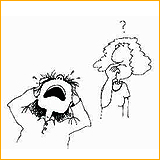| Mental Health Tips | |
| Common Mental Problems | |
| Substance Misuse | |
| Treatment of Mental Disorders | |
| Mental Health Education Pamphlets | |
 Specific Learning Disability
Specific Learning Disability
(Special thanks to Dr. Gloria Chow of Institute of Mental Health, Castle Peak Hospital, for authoring this article)
Specific Learning Disability (special learning difficulty) is a classification including several disorders in which a person has difficulty learning in a typical manner. People with learning disability have trouble performing specific types of skills or completing tasks if left to figure things out by themselves or if taught in conventional ways. Interventions may be used to help the child learn strategies that will foster future success.
Teachers and parents will be a part of the intervention. School educational psychologists quite often help to design the intervention and coordinate the execution of the intervention with teachers and parents. Social support can be a crucial component for students with specific learning disabilities in the school. With appropriate support and intervention, people with learning disabilities can succeed in school and go on to be successful later in life.
1. What is a specific learning disability?
2. What effect does it have?
3. What can help?
1. What is a specific learning disability?
A child with a specific learning difficulty is as able as any other child, except in one or two areas of their learning. For instance, they may find it difficult to recognise letters, or to cope with numbers or reading.
There are many different types of specific learning difficulty, but the best known is probably dyslexia. In dyslexia, the child has difficulty with spelling and reading. It may be difficult for parents and teachers to realise that a child has this sort of problem, especially if their development has progressed without concern in the early years.
Often, the child will appear to understand, have good ideas, and join in storytelling and other activities, as well as other children, and better than some. Sometimes it can take years for adults to realise that a child has a specific difficulty.
2. What effect does it have?
Specific difficulties can make lessons challenging for a child. They may struggle keeping up with classmates, and may come to see themselves as stupid, or no good. They may find it difficult to concentrate on lessons and, because they may not be able to follow them properly, they may complain of lessons being `boring'. The child may search for other ways to pass the time and to succeed. They may try to avoid doing schoolwork because they find it impossible to do it well.
Doing badly in school can undermine their self-confidence. This can make it harder for the child to get along with other children and to keep friends.
Children with specific reading difficulties often become angry and frustrated, so behavioural problems are common. If they don't get suitable help, the problems may get worse. Older children may fail exams or get into serious trouble - both at school and outside.
A specific learning difficulty is not a mental illness. However, children with a specific learning difficulty are more likely to develop mental health problems, for example anxiety, or have additional developmental disorders such as Autism Spectrum Disorders and Attention Deficit Hyperactivity Disorder (ADHD), than other children.
3. What can help?
Parents can discuss their concerns with the teachers and school. Teachers would help to identify which children have special educational needs and make sure that they get the additional help that they require. They would help to refer to educational psychologists, school social workers, and clinical psychologists to assess and help children with this type of problem. More detail assessment and training resources would be provided by Child Assessment Centre. The school may offer extra help using different ways of teaching to suit the child’s specific needs.
If the child's learning problem has resulted in emotional or behaviour problems, due to frustration or loss of self-confidence, more specialised help may be needed. The child's school or family doctor will also be able to help. If necessary, the child can be referred to child psychiatrists at local child and adolescent mental health service who will be able to offer help and support.
Websites with relevant information / Reference
The Royal College of Psychiatrists|
================================================================================ Thank you for browsing the mental health tips on the IMH internet. We would like to hear feedback from you through the questionnaire below. Your comments are most welcome for our continuous improvement. |
No. of visitors of this page: 758


